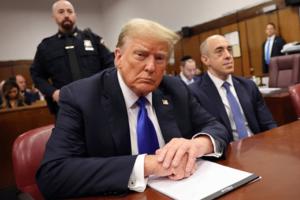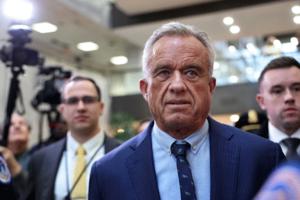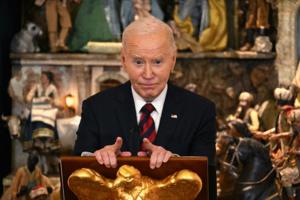Politics
/ArcaMax

Juan Pablo Spinetto: Mexico's safest state risks being overwhelmed by its own success
Taking off from Mérida’s airport, in Mexico’s southeastern Yucatán state, offers some breathtaking views: the emerald waters of the Gulf of Mexico, the unusual geography shaped by an asteroid millions of years ago. But you might also note something else: gaps in the forest cover gashed out by massive real estate projects — private ...Read more

Sarah Green Carmichael: Equitable marriages could save lives (and love)
Most Americans who marry say “I do” between 25 and 30 — ages when serious illness is probably not the first thing on their minds. But in a way, tying the knot is a major health decision. For men, just being married is a predictor of living longer. For women, the picture is more complex.
Among men with prostate cancer, married men survive ...Read more

Jackie Calmes: A peaceful transfer of power -- you can thank Biden
Did you miss it? On Tuesday, the electoral college made official what we've known for six weeks: Donald Trump defeated Kamala Harris for the presidency.
Americans could be excused for being unaware that electors met in all 50 state capitals and the District of Columbia to cast votes. In nearly every presidential election year, the ...Read more

Commentary: History will be kinder to Joe Biden than the pollsters
Now that pollsters are declaring President Joe Biden a “failure,” historians will reckon with too many economic signals rendering the prevailing narrative little more than media noise.
From the American Rescue Plan Act of 2021 that ushered in the longest period of unemployment below 4% since the 1960s to the Infrastructure Investment and ...Read more

Editorial: Putin's weaker than he looks. Seize the opportunity
Russian President Vladimir Putin has sought to project an image of economic strength while prosecuting the war in Ukraine, as if he could easily outlast the West’s efforts to counter his aggression. If President-elect Donald Trump and other Western leaders want to negotiate a prudent peace deal, they shouldn’t buy it.
More than most ...Read more

Tad Weber: Elon Musk thinks high-speed rail is wasteful? Cutting funds would be the crime
Sacramento-area congressman Kevin Kiley took to the floor of the House of Representatives recently to declare the following:
“Mr. Speaker, I am very happy to report that the newly formed Department of Government Efficiency has honed in on perhaps the single-greatest example of government waste in United States history,” the Republican from ...Read more

Editorial: Drone phenom sheds light on feds' transparency flaws
It seems everyone has a theory on the nocturnal drone sightings that have alarmed residents in the Northeast. They’re from our government, they’re from a foreign country, they’re planes, they’re just normal drones, they’re extraordinary craft that elude regular detection.
One thing we are sure of: The Biden Administration has dropped ...Read more

Editorial: Trump is guilty and not immune -- His Stormy Daniels hush money conviction remains
Even a terribly wrong-headed decision by the U.S. Supreme Court on a president’s post-White House criminal immunity can’t undo Donald Trump’s 34 felony convictions correctly ruled Acting Manhattan state Supreme Court Justice Juan Merchan.
You remember Merchan, who oversaw Trump’s Stormy Daniels hush money trial downtown in the spring ...Read more

Commentary: Supreme Court ruling on trans care is literally life or death for teens
Last month, the Supreme Court heard arguments on whether banning essential health care for trans youth is constitutional. What the justices (and lawmakers in many states) probably don’t realize is that they’re putting teenage lives at risk when they increase anti-trans measures. A recent report linked anti-transgender laws to increased teen ...Read more

Dan Rodricks: Luigi Mangione and where we are now
In February 1992, chicken magnate Frank Perdue received a pie in the face from a protester in a chicken costume during a meeting of the University of Maryland Board of Regents in Baltimore.
Perdue was founder, president and CEO of one of the nation’s largest poultry processors. More than that, he was the face of the poultry industry because ...Read more

Editorial: Trump lawsuits, threats a clear and wrongheaded effort to bully the press
It’s wrong for the incoming president to start suing newspapers and it’s a transparent effort to bully the press, but there Donald Trump stood Monday, proclaiming that “we have to straighten out the press. Our press is very corrupt. Almost as corrupt as our elections.”
Neither the press nor elections are crooked, but Trump is now suing...Read more

Editorial: Haiti desperately needs a new, bigger UN mission -- and American leadership
As Haiti endures a devastating crisis marked by escalating violence and lawlessness, urgent international intervention is required to address the growing chaos. With President Joe Biden preparing to leave office and Donald Trump poised to take power, the need for decisive action is clear.
Haitians are enduring unprecedented levels of brutality....Read more

Robin Abcarian: The latest evidence that putting RFK Jr. in charge of public health would be a disaster
Polio came for 5-year-old Lynn Lane when she was visiting her grandmother in rural Indiana. Suddenly, her arms and legs became weak, and by the time she got to a hospital in Indianapolis, she was totally paralyzed and in respiratory failure. Lane spent the next several months in an iron lung.
"I don't really remember too much about that," Lane,...Read more

Commentary: Here's what is so unusual about the Wisconsin school shooting -- and what isn't
The Dec. 16 shooting at Abundant Life Christian School in Madison, Wisconsin, has shocked the nation, not only for its horror but for its unique profile. This time, a teenage girl opened fire inside her school, killing a teacher, another student, and apparently herself, and injuring six others. Although female school shooters are exceedingly ...Read more

Editorial: Idaho doesn't have to accept that some form of school vouchers is inevitable
Much of the discussion around the issue of using taxpayer dollars to help families send their children to private schools has centered on coming up with a compromise, because it’s inevitable this is the year — finally — that Idaho legislators approve some form of taxpayer-funded private education.
It’s a tempting position to take: “...Read more

Editorial: Biden's 'kids for cash' clemency is offensive to victims, and to justice
The commutation of the prison sentence of former Luzerne County judge Michael Conahan by President Joe Biden is a disgraceful act that dishonors the children and families victimized by the judge and his accomplice, Mark Ciavarella, during the notorious "kids for cash" scandal two decades ago.
It is a particularly bitter irony that the scandal ...Read more

Commentary: If South Korea's president is impeached, who should replace him?
Last weekend, South Korea’s Congress passed an impeachment bill for President Yoon Suk Yeol.
While the constitutional court of Korea is expected to deliver a final verdict within 180 days, the odds are not in the president’s favor due to his imposition of martial law and adverse public opinion. Following the court’s ruling, South Koreans ...Read more

Commentary: The Consumer Financial Protection Bureau has irked billionaires, but it serves the public well
The billionaire Elon Musk and the California venture capitalist Marc Andreessen have started a debate about the role of government that we should be having — but it might not go the way they would hope. They don’t like government agencies that stop corporations like theirs from ripping off consumers.
They especially hate the 14-year-old ...Read more

POINT: Biden must take urgent action to maintain our democracy
In his first campaign ad of 2024, President Joe Biden asked the question over images of Dr. Martin Luther King Jr. and January 6 rioters: “What will we do to maintain our democracy? History’s watching.”
For one last month, Biden retains the responsibilities and powers of the nation’s highest office. If he believes his words, he must ...Read more

Editorial: Drinking is up nationwide, so pace yourself over Christmas and New Year's
This holiday season, whether you raise a toast, or spike the punch or have a drink to take the chill out of your bones, do so thoughtfully.
Alcohol may make the seasonal celebrations feel more festive. A drink or two may seem to comfort those whose holidays aren’t particularly joyful. But increasingly, Americans are drinking more than they ...Read more


























































